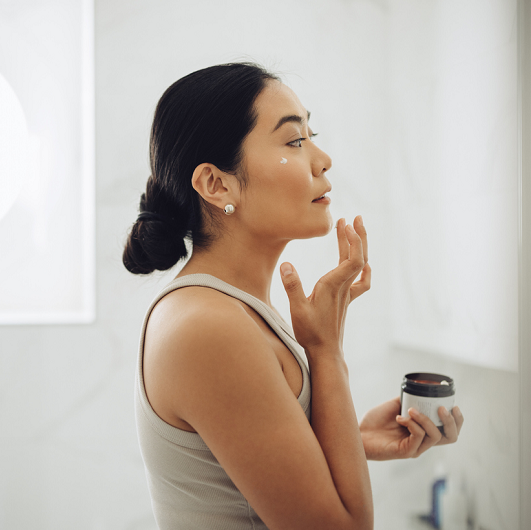Does Sweat Cause Pimples?

June 04, 2024
If your acne flares in warmer weather or after hitting the gym, you may suspect that sweating causes pimples. It’s partly true – sweat that remains on your skin may contribute to breakouts.
“Perspiration on the skin contributes to acne, not the summer season itself,” says dermatologist, Mariela Mitre, M.D., Ph.D. “However, people sweat more during July and August than in January or February.”
Because you sweat more during the summer, you may get more pimples during warm weather. Knowing why you’re breaking out may help you control sweat-related acne.
“Understanding how perspiration contributes to breakouts may help you limit your summertime acne,” Dr. Mitre says.
How Sweat Affects the Skin
People get pimples when their pores get clogged on the face, back or elsewhere. There are different things that may cause the pores to become blocked:
- Makeup, sunscreen and moisturizers, which sit on the skin. Oily skin-care products may clog pores, leading to acne.
- Bacteria, which live on everyone’s skin. Bacteria that get into the pores cause acne.
- Sweat, which comes from sweat glands within the skin. Sweat that sits on the skin and mingles with bacteria may cause acne.
It’s normal and natural to have bacteria on your skin. When certain strains of bacteria get deep into oily pores, they may cause pimples.
When you let sweat sit on your skin, it intermixes with bacteria and oil. The combination of sweat, oil and bacteria may increase your risk of developing acne and lead to more severe breakouts.
How often should you wash your face to reduce acne?
Washing your face twice daily helps to control sweat, bacteria and oil. If you cleanse your face more often than that, it may backfire.
“Washing your face too frequently can cause irritation, stripping your skin of natural oils,” says Dr. Mitre. “Some people wash more often, hoping for less acne but ending up with more due to over-drying and irritating their facial skin.”
How to Minimize Breakouts Caused by Sweat
Intense workouts or time spent outdoors may leave you feeling sweaty in warmer weather. These hygiene hacks may keep you from breaking out more than usual:
- Avoid wearing makeup during hot activities. Wiping your sweaty face while wearing makeup may clog your pores with makeup. When makeup blocks your pores, oil may become trapped, which may contribute to acne.
- Use water-based sunscreen or moisturizer. Put water-based products on your skin, not oil-based products. Water-based products are less likely to clog pores, which should limit breakouts.
- Change out of sweaty clothing as soon as possible. Wearing damp, sweat-soaked clothing feels unpleasant, and it keeps bacteria against your skin. Acne may develop on the chest or back, not just the face.
- When you’re sweaty, shower or wash your face. You’ll feel cleaner and better after a workout or time out in the sun. Try not to shower more than twice daily, and use a gentle facial cleanser.
- Splash yourself down as an alternative. You may not have access to showers or cleansers every time you feel sweaty. To cool off and remove some bacteria from your face, splash yourself with water.
- Be gentle with your face. Scrubbing hard with a washcloth or using exfoliation products can cause irritation. Whether you’re cleansing or wiping away sweat, pat your skin gently.
- Consider early-morning or late-evening walks or runs. You may sweat less if you exercise at cooler times of the day. On the steamiest days, consider an indoor treadmill instead of your usual outdoor route.
- See a dermatologist for advice and treatment. If you’re sweating more and can’t control your acne, seek guidance from a professional. Dermatologists can assess your skin, health conditions and lifestyle habits, then offer personalized help.
Next Steps & Resources:
- Meet our source: Mariela Mitre, M.D., Ph.D.
- To make an appointment with Dr. Mitre or a doctor near you, call 800-822-8905 or visit our website.
The material provided through HealthU is intended to be used as general information only and should not replace the advice of your physician. Always consult your physician for individual care.






